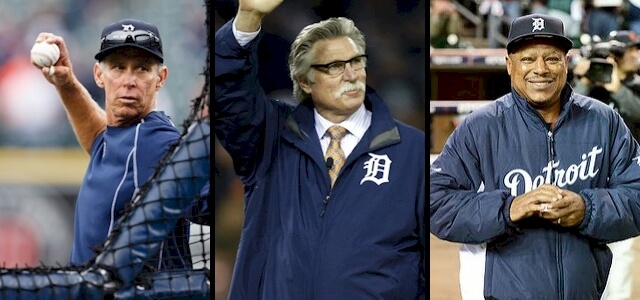
Shortstop Alan Trammell, pitcher Jack Morris, and second baseman Lou Whitaker were key members for the World Champion 1984 Detroit Tigers. Their Baseball Hall of Fame candidacy has been one of the most controversial in recent years.
Those of us who have been waiting for fifteen years for the writers to vote Alan Trammell into the Baseball Hall of Fame weren’t exactly surprised when Tram once again failed to get the votes he needed this year. When results of his final year on the writers’ ballot were announced January 6 there was no sudden epiphany, but Trammell did top the 40 percent mark for the first time. Big deal.
Trammell’s lack of support is a head-scratcher, given that he is the eighth-best shortstop of all-time according to WAR (70.4) and that his statistics match up almost perfectly with Hall of Famer Barry Larkin—and are arguably better than several other shortstops already in Cooperstown (they are almost as good as overrated Cooperstown shoo-in Derek Jeter, at 71.8).
Interviewed a day before the vote was announced by MLB Network Radio on SiriusXM, Trammell was resigned to his exclusion but as classy as ever. He said he didn’t expect a call, but he added:
“I’m hoping that maybe someday my partner Lou Whitaker and I will start to get a little momentum in the Veterans Committee down the road… That would be my dream if I ever was to be so lucky to be elected: I would go in with my partner.”
Trammell’s final exit off the writers’ ballot opens the door for him to enter the Hall of Fame by the one possible remaining method—a selection by the veterans committee. But will he get his wish of going in along with his double-play partner?
When Whitaker was dropped from the writers’ ballot after the first year of his eligibility, in which he failed to get the necessary 5 percent to stay alive, it was even a bigger travesty than Trammell’s exclusion. Whitaker’s career WAR of 74.9 is higher than Tram’s and much better than recently elected Hall of Fame second baseman Roberto Alomar (66.8). In fact, it is seventy-eighth among all players all time (Trammell is tied for ninety-third). Given that there are more than 200 former major league players in Cooperstown, something is obviously amiss.
Both men, one of the very best double-play combinations in baseball history, would have been in Cooperstown years ago if they had played in New York. For nearly a generation this pair defined the heart and soul of the Tigers, and along with fellow non-inductee Jack Morris they were the backbone of the club’s great mid-1980s teams. Now the trio all await the veterans committee’s efforts to rectify the writers’ mistakes.
The path ahead for all three is a bit complicated. The veterans committee looks at three different groups—the “Golden Age” era players before integration, the “Post-segregation” era starting with Jackie Robinson’s debut, and the “Expansion Era” starting with 1973. These focuses rotate every three years. To be considered , however, a player from the most recent era must be retired for sixteen seasons, or must be off the writers’ ballot for one year. The “Expansion Era” committee met in 2013 and will convene again at the winter meetings this December.
As it turns out, Whitaker, whose last season was 1995, was eligible the last time the panel considered “expansion era” players in 2013 but was not selected. Morris, whose last year on the writers’ ballot was a year ago, is therefore eligible this December in that committee for the first time. But Trammell has to cool his heels for a year after his final year on the writers’ ballot—and so he has to wait until 2019 when the “Expansion Era” committee convenes again.
Of course, there’s absolutely no way to know what the members of the veterans committee will do. They’ve already passed by Lou once—maybe because they don’t think he’s deserving or maybe because they’re waiting on Trammell. They will have their first chance at Morris this year. Whitaker and Morris could go in this year—and be inducted in the annual ceremony next summer. But it won’t be until the summer of 2020 that the Tigers could have a dream triple induction.
The Tigers have had only one player inducted into Cooperstown in the past thirty-three years—Jim Bunning in 1996, and he spent half his career in the National League. You have to go back to George Kell in 1983 and Al Kaline in 1980 for the induction of a pure Tiger.
Next year, Ivan Rodriguez, who spent five seasons of his long and Hall of Fame-worthy career playing for Detroit, will be on the writers’ ballot for the first time, and he’ll get in sooner or later. That means four former Tigers will be waiting for the call from the Hall in the near future.


